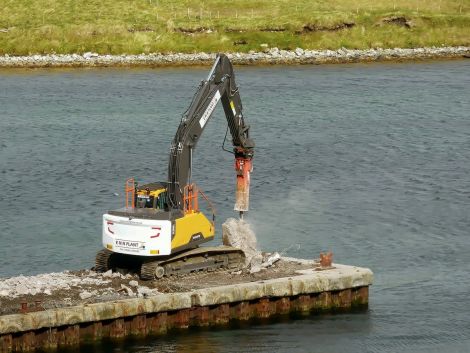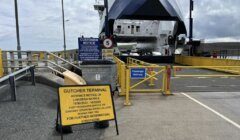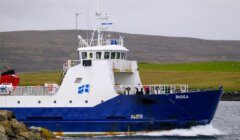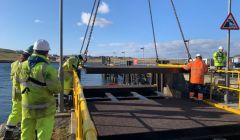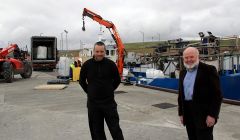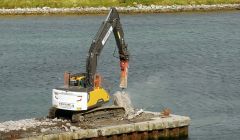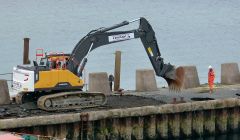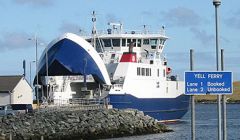Council / Delays add extra half a million to Toft Pier bill
DELAYS to rebuilding the Toft Pier is set to cost Shetland Islands Council over half a million pounds – with one elected member saying it is “just not good enough”.
The council’s harbour board heard on Wednesday that the project is now facing increased costs of around £525,000.
Councillors are set to receive a separate report on this cost at a later date as the local authority seeks approval for the increase in the budget.
The project, originally priced at £2.9 million, has faced a melting pot of delays including trouble gaining consents and licences, weather and the Covid-19 lockdown.
Lerwick councillor Amanda Hawick said the increased cost was “just not good enough” and she expressed concern over where the extra half a million may come from.
A report to the harbour said that “despite significant effort to minimise additional costs, the weather related delays, unforeseen ground conditions and Covid-19 restrictions have resulted in increased costs of approximately £525k on this project”.
The timetable for competition of the project is now winter 2020.
The project to rebuild and extend the run-down pier was approved by councillors last year, with the hope that it could attract more fishing traffic.
The work is being carried out by Devon-based contractor Teignmouth Marine Services.
Around one third of the £2.9 million cost is being covered by grant money from the European Maritime and Fisheries Fund (EMFF).
A number of councillors on the harbour board expressed concern over the extra cost arising from the delays.
Marine and airport infrastructure manager Andrew Inkster told the meeting that work was meant to start in June last year but unforeseen problems with obtaining licences meant it only got underway in August.
The process of securing the licences, which covered areas like dredging work and the environment, involved external agencies like Marine Scotland, SEPA and Scottish Natural Heritage.
Become a member of Shetland News
Inkster said the council had been assured the licences would be in place on time, but more studies were required.
With the start date slipping a large chunk of the summer weather had been missed.
There were also issues with some boulders that did not appear in pre-work surveys, but Inkster said this was not unusual.
Piling works took place from late August to November and as a result of Christmas and the weather the contractor demobilised in December and only returned in March – just before the lockdown kicked in.
Inkster said he was “very disappointed” with the additional cost but was comfortable the council had done what it could.
Hawick said she had raised worries over the project and its cost when councillors approved the budgeted spend last year.
“I’m fairly concerned where this [additional] money is going to come from,” she told Wednesday’s meeting.
Infrastructure director John Smith said more details about the extra cost will come to other committee meetings in the future.
Hawick was also puzzled that Shetland’s well-known weather conditions led to unexpected delays.
Inkster, meanwhile, said he was “absolutely satisfied that the contractor priced the job correctly”.
When asked if there could be any more unforeseen costs, he said no – but a future outbreak of coronavirus could put another spanner in the works.
After councillor Allison Duncan asked if this year’s winter could pose more problems, Inkster suggested the type of work now being undertaken was less vulnerable to the conditions.
“It’s a risk, but it’s a diminished risk,” he said.
Inkster added that local contractors are currently doing work on site who are “absolutely aware of Shetland weather”.
Lerwick councillor Stephen Leask questioned what would happen if the SIC did not pay the extra bill, with Smith conceding that the EMFF grant money would likely be lost.
During debate Shetland Central member Davie Sandison suggested there needed to be a more “forensic” look at the process around gaining the consents for the work.
Duncan also referred back to concerns raised over the project when it got approved in 2018.
North Isles member Duncan Anderson, however, said he had been reassured that everything had been done right from the council’s perspective, although he did agree with looking more into the role external partners had played.
In reference to the weather, the councillor said: “When you are only starting in August you are up against it from the beginning.”
Leask said he felt the council was in a “Catch 22” position and added that he reluctantly felt the SIC would have to pay the extra cost to move forward with the project.
Become a member of Shetland News
Shetland News is asking its readers to consider paying for membership to get additional perks:
- Removal of third-party ads;
- Bookmark posts to read later;
- Exclusive curated weekly newsletter;
- Hide membership messages;
- Comments open for discussion.
If you appreciate what we do and feel strongly about impartial local journalism, then please become a member of Shetland News by either making a single payment, or setting up a monthly, quarterly or yearly subscription.






